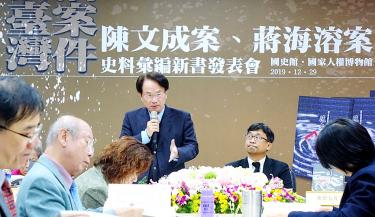The Academia Historica is to publish a compilation of historical materials related to late democracy activist Chen Wen-chen (陳文成), including documents that link Chen’s case to the Kaohsiung Incident, the academy’s curator said.
The records, for which historians previously had to apply for access to view, became available in book form, as well as digitally, starting yesterday, curator Chen Yi-shen (陳儀深) said.
The academy’s role as presidential record-keeper gave it a particular responsibility to publish the materials, which include interrogation transcripts and briefings that were provided to former president Chiang Ching-kuo (蔣經國), Chen Yi-shen said.
One of the records’ most important functions, he said, would be to strengthen the historical connection between Chen Wen-chen’s mysterious death in 1981 and the government’s crackdown on a demonstration organized by the Kaohsiung-based political journal Formosa Magazine two years earlier in what came to be known as the Kaohsiung Incident.
Although Chen Wen-chen was spared the events of 1979 because he was working as a mathematics professor in the US, he had come to the authorities’ attention as one of Formosa Magazine’s main financial backers, Chen Yi-shen said.
Chiang’s order — recorded in a December 1979 diary entry — to “cut the roots out” of the magazine, resulted in a much more wide-ranging investigation than is traditionally understood, Chen Yi-shen said.
Chen Wen-chen returned to Taipei on May 20, 1981, to visit his family. On July 2, 1981, he was taken for questioning by the Taiwan Garrison Command, a since-disbanded security force.
While the government said that Chen Wen-chen was released after questioning, his body was discovered the next day on the campus of National Taiwan University.
Transcripts of the interrogation that took place on July 2, as well as briefings later given to Chiang, focus on Chen Wen-chen’s fundraising for the magazine, which he did by collecting donations and sending them by check to activist Shih Ming-te (施明德), the curator said.
Given Chiang’s fear that activists were receiving help from Beijing, the authorities also questioned Chen Wen-chen on the magazine’s political aims, pressing him to admit that its support for multi-party rule was an attempt to foment rebellion against the Chinese Nationalist Party (KMT), Chen Yi-shen said.
By giving academics and the public greater access to these documents, the curator said he believes Chen Wen-chen’s case would be reassessed, allowing it to be seen as an extension of the Kaohsiung Incident rather than something that occurred in isolation.
The greater mystery is how the young activist died, and on this subject, there is still much information that needs to be declassified, he added.
Source: Taipei Times - 2019/12/30









